In Part 2 of How to Practice Creatively, I talked about Focused Practice sessions where you pinpoint the problem areas and work only on those, with a play-through of the entire piece as close to tempo as possible every 2-3 days. This intentional kind of practice is one way to keep the mind engaged and avoid boring practice sessions. But when playing straight through to assess progress, it’s possible then that those sessions could become that blind repetition that we’re trying to avoid. In this article, I will discuss the importance of playing expressively.
Use Your Imagination
You really don’t ever want to play something unmusically or lacking in expression. This is because that will get drilled in to how to finally execute a piece. When we hear a piece over and over again in a particular way, say you listen to the same recording of a song – then that is how you will always seek to hear it. So if you always play a Bach prelude mechanically from day 1, well, that’s how it will sound on day 30, and it will be much harder to “re-hear” a new way of playing it after you’ve done 30 days of mechanical.
So the key I think is to get a musical rendition of the piece you’re working on in your head as early in the learning process as possible. A lot of this will vary depending on your experience in music thus far, but we all know what certain songs we hear a lot should sound like. If you had to, could you sit in a quiet space and “playback” in your mind your favorite song (or at least some parts of it)? When you do this, you are engaging your imagination, because no sound is actually happening, but you “hear” it in your head.
It is this imagination that we want to engage in pieces that we are playing. Part of cultivating this ability happens over time, so if you are unable to do this as a beginner, don’t fret. The more music you are exposed on piano, the better you will be able to get the imagination going in coming up with how you want to play a piece or how you want it to sound.
The Danger of YouTube
Now some people recommend listening to recordings on YouTube or iTunes to come up with ideas. I don’t think this is bad, but it does come with this problem: it can override your imagination.
I first heard Beethoven’s Waldstein sonata Op. 53 played by Alfred Brendel, and that’s how I fell in love with that piece. I’ve probably got every nuance memorized on how he plays it, too. So when I play that back in my mind, Brendel’s rendition takes over.
Because I have listened so much to one version, however, I have to “fight” against blindly playing Brendel’s version. You may be thinking, “If I can play like Brendel, how can that be a bad thing?” But the world already has a Brendel, and you have things you want to say that maybe nobody has heard before.
Plus, it is sad to assume that what someone else has to say in their music is more important, significant, and authoritative than what you have to say. Every human experiences emotion and thus that makes us musical beings, because music exists to communicate emotion. Some of us may be more adept at knowing how to express through the notes we play than others, but that is just a skill. It’s not a talent that either you have or don’t have. If this is the kind of thought process you have and think that you aren’t musical, then I recommend you banish that thought from your mind right now. Just because you don’t know how to do something doesn’t mean you will always be incapable of it going forward.
If you want to learn more about playing expressively, you may want to check out my Guided Self-Study course on Musical Expression (Coming soon).
Wait to Listen
So the best solution is to listen to a few different versions one time only. This may help you assess if you want to study this piece, or perhaps inspire you to get started. But after that one time, go at the piece yourself and no longer listen to recordings. Instead, use your own imagination to play through the piece in your head – not during a regular practice session, but away from the piano and possibly away from the score as well. This will help you to decide which parts you think need more expression, or even come up with different ideas on what you can do.
There may be some moments later in your process on learning a piece where you’re really not sure what to do musically. Then I think it’s a great idea to listen to several professional recordings to come up with some ideas. Usually, you will like some aspects of one pianist’s version and some of another, so what you end up with is some amalgamation of the two – which is perfectly fine! We just want to avoid having the imprint of someone else’s ideas on an entire piece to overcome.
When to Play Expressively (and When Not To)
Once you have this idea of how you want to play a passage musically, then play it that way whenever you play your piece straight through, or whenever you play a passage. So if you are focusing on a particular passage, you may want to just play that and assess what the problem is, or to see how it’s progressing without playing through the whole piece. In these times, you want to play it as expressively as you are able.
If, however, you are breaking a passage down for technical work, then it’s not necessary to be musical then – or it might even be impossible if you have a technical problem. Here playing expressively would actually get in the way of trying to overcome technical issues. So get that figured out first, then try to play the passage musically. In general, try to play musically as often as you can in your practice sessions.
If you ever find yourself becoming “bored” with practice, then you might not be playing expressively enough. Expressive playing will engage the mind fully and it will bring you the most pleasure when you can execute it.
Do you use the imagination when you are playing or to practice away from the piano? What role does expressive playing take in your practice sessions? Please share your experiences in the comment section below!
Join me in the next session where I discuss what Practicing Slowly means and how to take advantage of this powerful technique without letting your mind space out.


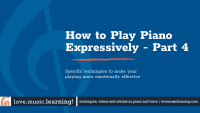
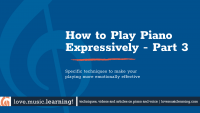
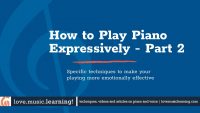
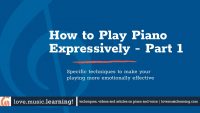
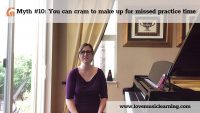

Thanks for these articles, I enjoy reading them. I find that sometimes adding my own expression (or how I feel at the time) is better than trying to follow what’s written. Better meaning it feels less forced and not trying to meet the expectation of what’s on the sheet. Of course, it could be all wrong, but it allows for variability and less boredom.
Another thing I sometimes play around with is articulation, e.g. legato vs. detached. Case in point, Menuet in D Minor by Buttstett for RCM 4. I played just today at my lesson and my teacher expected it legato. The CD that comes with book is clearly detached, most YouTube videos you hear it legato. ARgh .. I played the CD version for my teacher and she said to continue playing it detached. Not sure which is right or wrong, or neither. In any case, one could try playing it both ways to mix things up 🙂
I know what you mean with the confusion as to what’s right and wrong. You may just want to think of it as the freedom to choose what you like best! In the end, it has to sound good to you. 🙂